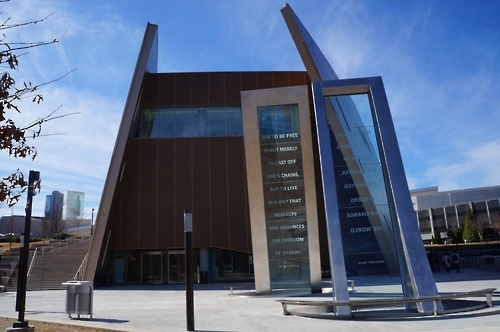A committee seeking to erect a girl's statue symbolizing victims of its wartime sexual slavery in Atlanta, Georgia, said Saturday that Japan has mounted an offensive to foil the installation.
Japanese Consul General in Atlanta Takashi Shinozuka is meeting with influential figures in the US city to squash the plan, the committee said in a press conference Friday, adding that word of the installation is spreading.
Earlier this month, the committee, including a group of Korean-Americans, announced it would push ahead with the installation at the Center for Civil and Human Rights museum on April 27.
 |
This undated file photo shows the Center for Civil and Human Rights in the city of Atlanta, Georgia, where a girl's statue symbolizing victims of Japan's wartime sexual slavery will be set up in April 2017. (Yonhap) |
According to the committee, the Japanese side is warning about an economic fallout resulting from many Japanese companies operating in Atlanta ditching the US city if the statue is erected.
At Friday's news conference, the committee headed by Korean-American Kim Baek-kyu categorically rejected Japan's warning, saying there is no link between the statue and economic impact.
It stressed the importance of establishing the statue to promote both human rights and a cause not to repeat the unfortunate history between the two Asian countries, pointing out Japan's claim over the economic impact has been made in many US cities as part of its efforts to foil the statue installations and calling it "fabricated."
One of the 25 committee members, former US Congressman Michael Honda versed in the comfort women issue, said at the press conference that the Japanese consul general's assertion of the statue's economic influence on the local economy is not true.
The committee also revealed a reply, sent by the California Commerce and Industry, about whether a comfort women statue would have economic influence on the economy on California, where a monument on comfort women will be erected in September. The reply said the establishment of the monument will have no economic influence.
The committee also rejected Shiunozuka saying the statue row is an issue between South Korea and Japan only, citing it is comprised of 10 Korean-Americans and 15 other ethnic people, including Japanese, Australian, Philippine, Chinese, Indonesian, Vietnamese and European.
"(The installation of a girl's statue) is never an anti-Japanese movement, but a campaign to express the objection of human rights violations," the committee said there are such statues and monuments in 53 cities worldwide, which makes Japan's assertion lose credibility.
The committee pushed ahead with the installation plan for three years in secret due to the sensitive nature of the issue, adding the statue will be erected on the lawn next to the main hall of the Center for Civil and Human Rights.
Located in downtown Atlanta and opened in 2014, the center is a museum dedicated to the achievements of both the civil rights movement in the United States in the 1950s-1960s and the broader worldwide human rights movement.
The bronze statue of a barefoot seated teenage girl in a traditional Korean "hanbok" dress, similar to another set up in front of the Japanese Embassy in Seoul, will sit on a marble base 2 meters wide and 1.23 meters long.
It will mark the third time that a statue, which represents "comfort women," Korean women forced to work in wartime Japanese military brothels, is installed in the United States following ones in Glendale, California, and Southfield, Michigan.
The museum has confirmed the planned statue installation. It has given the resident group support in the project, making itself the center of attention as the U.S. city is the birthplace of the African-American civil rights movement. Atlanta hosts the birth home, a memorial hall and the tomb of the late American civil rights leader Martin Luther King Jr.
In August last year, a right-wing Japanese group, the Global Alliance for Historical Truth, filed a suit demanding the statue in Glendale be removed, but it was to little avail. A US court rejected the demand, saying Glendale did not use the statue for diplomatic purposes.
Historians estimate that up to 200,000 women, mainly from Korea, which was a Japanese colony from 1910 to 1945, were forced to work in front-line brothels for Japanese soldiers during World War II. But Japan has long attempted to water down the atrocity. (Yonhap)




![[Herald Interview] 'Trump will use tariffs as first line of defense for American manufacturing'](http://res.heraldm.com/phpwas/restmb_idxmake.php?idx=644&simg=/content/image/2024/11/26/20241126050017_0.jpg)

![[Health and care] Getting cancer young: Why cancer isn’t just an older person’s battle](http://res.heraldm.com/phpwas/restmb_idxmake.php?idx=644&simg=/content/image/2024/11/26/20241126050043_0.jpg)

